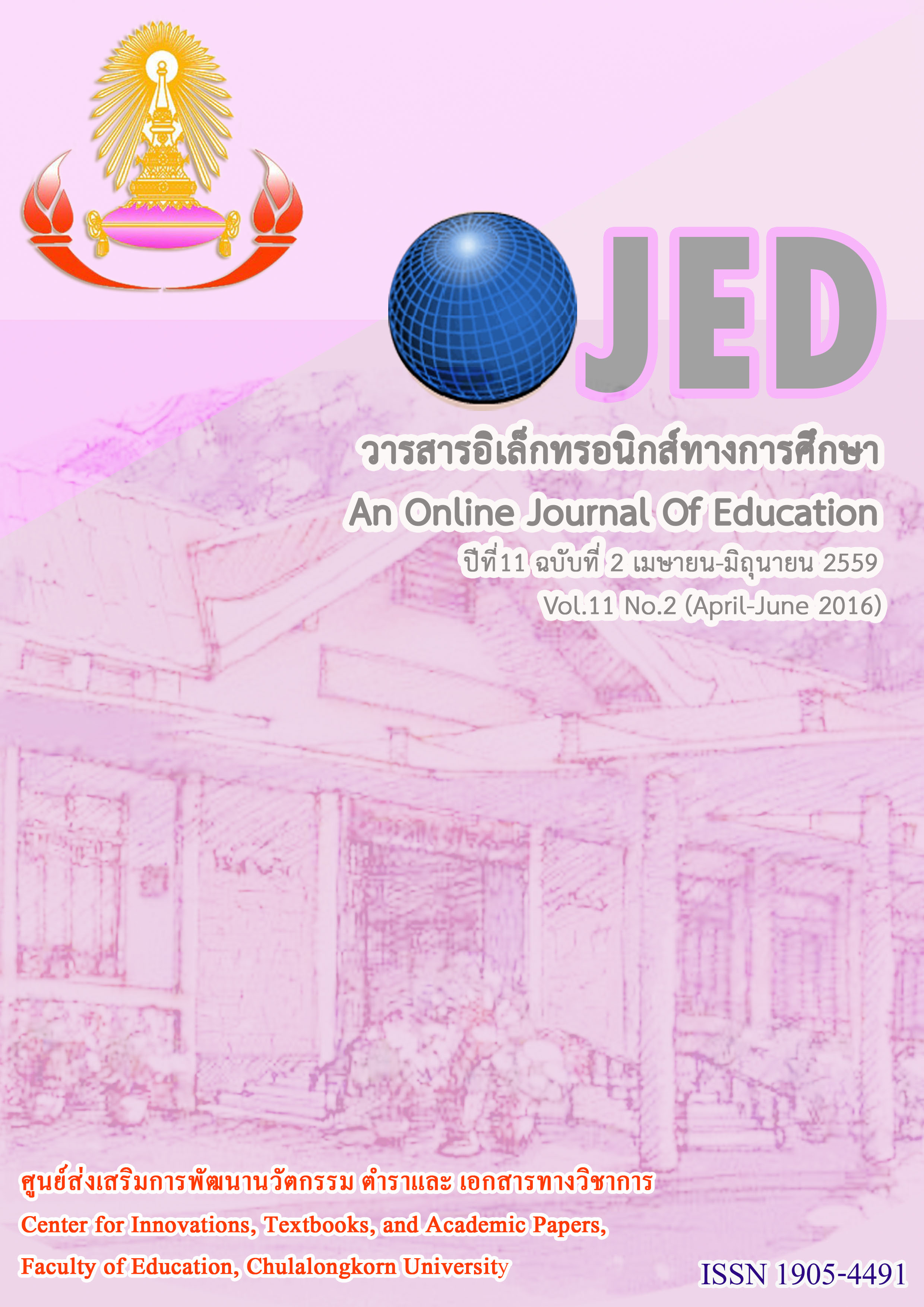การจัดการเรียนการสอนเปียโนโดยการสะท้อนคิด เพื่อพัฒนาทักษะการบรรเลงเปียโน สำหรับนักเรียนเปียโนระดับกลาง ORGANIZING REFLECTIVE THINKING PIANO LESSONS TO DEVELOP THE PIANO SKILLS OF INTERMEDIATE PIANO STUDENTS
Keywords:
การสะท้อนคิด, การจัดการเรียนการสอนเปียโน, นักเรียนเปียโนระดับกลาง, REFLECTIVE THINKING, PIANO LESSON, INTERMEDIATE PIANO STUDENTSAbstract
การวิจัยครั้งนี้มีจุดประสงค์ คือ เพื่อศึกษาสภาพการจัดการเรียนการสอนเปียโนโดยการสะท้อนคิดระดับเปียโนขั้นกลางในกรุงเทพมหานครในปัจจุบัน โดยเก็บข้อมูลจากการสอบถามครูสอนเปียโน การวิเคราะห์ข้อมูลใช้การวิเคราะห์ด้วยสถิติบรรยาย และวิเคราะห์ข้อมูลเชิงคุณภาพด้วยการจำแนกข้อมูล การเปรียบเทียบ และการสรุปเชิงอุปนัย
ผลการวิจัย พบว่า 1) ด้านวัตถุประสงค์ การให้ผู้เรียนนำความรู้ดนตรีที่เรียนไปประยุกต์ใช้ในการบรรเลงบทเพลงและการมุ่งเน้นให้ผู้เรียนเกิดความเข้าใจในเนื้อหาทั้งหมดเป็นวัตถุประสงค์ที่ผู้สอนให้ความสำคัญ 2) ด้านเนื้อหาสาระ ผู้สอนนำบทเพลงของ Bach, Beethoven, Chopin, และ Bartok มาใช้ในการเรียนการสอนมากที่สุด 3) ด้านการจัดกิจกรรมการสอน ผู้สอนส่วนใหญ่มีการใช้เทคนิคการใช้คำถามเพื่อพัฒนาการสะท้อนคิดของผู้เรียน 4) ด้านสื่อและอุปกรณ์ ผู้สอนส่วนใหญ่ใช้เครื่องบันทึกเสียงหรือกล้องวีดิทัศน์บันทึกการบรรเลงของผู้เรียน เพื่อส่งเสริมการสะท้อนคิดให้กับผู้เรียน 5) ด้านการวัดและประเมินผล ผู้สอนส่วนใหญ่มีการวัดและประเมินการสะท้อนคิดโดยใช้การประเมินตามสภาพจริง 6) ด้านบริบทการเรียนการสอน ผู้สอนให้ความสำคัญกับความรักความชอบในดนตรีของผู้เรียนและจิตวิทยาในการสอน จากการวิเคราะห์ทั้ง 6 ด้านแสดงให้เห็นว่า ผู้สอนมีการนำการสะท้อนคิดมาใช้ในการเรียนการสอนเปียโนระดับกลางในประเทศไทย เพียงแต่การมุ่งเน้นส่งเสริมการจัดการเรียนการสอนเปียโนโดยการสะท้อนคิดมีมากน้อยแตกต่างกันไปตามผู้สอนแต่ละคน
This research aims to study the conditions of reflective thinking in piano lessons for intermediate piano students in Bangkok. Data were collected from the questionnaires from piano teachers. Data analysis involved descriptive statistics and qualitative analysis by using data classification, comparison, and inductive conclusion.
The findings revealed that: 1) Regarding objective, providing students’ knowledge that they could apply to other songs and help students understand the lessons were important for piano teachers. 2) Regarding content, the teachers used Bach, Beethoven, Chopin, and Bartok repertoires to teach students the most. 3) Regarding instruction, many teachers used the question technique to improve students’ reflective thinking. 4) For media, most instructors used audio or video to record students’ performance to support students’ reflective thinking. 5) Regarding evaluation, most teachers evaluated student’s reflective thinking ability by using authentic assessment. 6) Regarding context, instructors give importance to students’ interest in music and the psychology of teaching. The analysis from the six aspects shows that these are the use of reflective thinking in intermediate piano lessons in Thailand. However, the emphasis of organizing reflective thinking piano lessons may vary among teachers.




